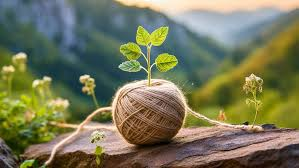Sustainable yarns are made with minimal impact on the environment, from ethically sourced fibres, and in a way that conserves natural resources and minimises landfill. With sustainable yarns including fibres such as bamboo, cotton, wool, and alpaca, let’s take a more in-depth look at the available options.
Many fibres contain plastics or acrylics, which contribute to a growing landfill crisis as they are unable to be broken down; however, the move towards more eco-friendly and sustainable fibres is growing in popularity, with a host of alternative options readily available.
Sustainable yarns
Cotton is lightweight, inexpensive, versatile, and warm. It has a medium drape and can hold its shape well, meaning tangles are prevented.
For knitters, blends such as mohair, alpaca and merino provide a beautifully soft yarn that slides easily across the needles and works well across a range of needle sizes.
Knitting tape made from 100% recycled cotton is a great alternative to traditional yarn and is useful for crafting baskets, coasters, or placemats.
Bamboo makes for an excellent plant-based yarn. Both silky and durable, it has a low environmental impact, low production costs, and is perfect for those who have adopted a vegan lifestyle.
The fashion-famous Manos del Uruguay yarn is ideal for crochet fans. It is 100% biodegradable and has a crochet-friendly pliable drape.

DK yarn
DK – or double knit – yarn is a medium to lightweight knitting yarn that is great for beginners. DK yarn comes in a range of fibre compositions, such as bamboo, cotton, and wool options, all of which make excellent sustainable choices for your knitting project. Whatever your project, you are sure to find the perfect DK yarn in the beautiful and extensive range available.
In addition to being earth-friendly, sustainable, and ethical, recycled or recyclable yarns tend to be of a higher quality than their man-made counterparts. A great deal of care is put into the production process and a natural dying process is often used, resulting in a superior standard. Why not try sustainable yarn for your next project?




